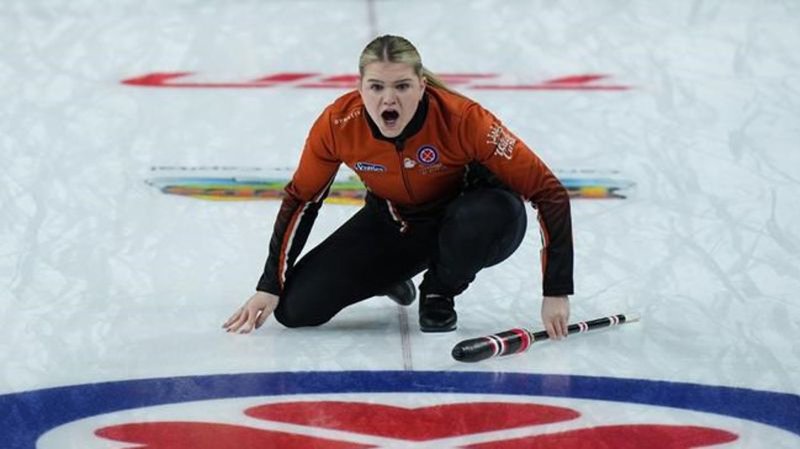
KAMLOOPS, B.C. — Three wild cards in Canada’s men’s and women’s curling championships apparently here to stay means keeping noses to grindstones to earn them.
Bumping up the number of wild-card berths from one to three was a COVID-19 adaptation in Calgary’s 2021 curling bubble.
Brought back by popular demand in 2022 and 2023, wild cards are a Plan B ticket to both the Scotties Tournament of Hearts and Tim Hortons Brier for teams which don’t win provincial or territorial championships.
Earning a wild card can be a wild ride.
Wild cards go to the top three teams in Curling Canada’s Canadian Team Ranking System (CTRS) that don’t win their provincial or territorial championship.
So it’s a matter of entering enough events and winning enough points during the season, while hoping a team ranked higher wins its province or territory so a wild card lands on you.
When the dust settled, Kaitlyn Lawes at No. 4, Casey Scheidegger at No. 6 and Meghan Walter at No. 7 in the CTRS earned wild cards for this year’s Hearts in Kamloops.
“We’re here, so that’s all that matters,” Walter said.
Defending champion Kerri Einarson topped Pool A at 3-0 following a 10-9 win in an extra end over Lawes on Sunday afternoon.
Lawes fell to 2-1 alongside B.C.’s Clancy Grandy and Nova Scotia’s Christina Black.
When Walter faced Jennifer Jones in the Manitoba women’s final Jan. 29, Walter’s Hearts prospects also rested on Rachel Homan winning Ontario that same day.
When Walter lost the final to Jones, Walter’s supporters were still happy because of a Homan win that dealt the third and final wild card to Walter.
“It’s a very odd thing,” Walter said Sunday in Kamloops.
There is no rest for a team that intends to pursue a wild card as a backup plan for entry into the Hearts and Brier.
“You can’t really lay off at all,” Walter said. “Next season, we’ve talked about it, we’re playing the same amount of events, 14 or 13 we’ve played.
“You’re not guaranteed to qualify (for playoffs) in every event and earn those big points.
“You’ve got to play in as many as possible and try to get to playoffs most of the time. Sometimes you fall short.”
Scheidegger, who lost to Kayla Skrlik in Alberta’s final, chased points this season with third Kate Cameron in charge of math.
“Most of the teams that are in the top 10 probably have that person that’s calculating, and making sure that you are in a good situation for that,” Scheidegger said.
“We attempted to play in ‘spiels that would give us the most kind of bang for our buck, so they would give us the most points.
“When you do come from a province that has had several wild cards come out of it the past couple years, it’s good planning to have that in the back of your mind.”
Three wild cards were a boon for Manitoba women this year.
Lawes and Walter took two for a total of four Hearts entries from that province, including Einarson and Jones.
“I do think everyone wants to win their provincials and everyone wants to wear their crest on their back, but knowing there are some provinces that have a lot of great teams, you do kind of have your eye on wanting to be at the top of the CTRS,” Lawes said.
“You might see teams chasing points. If you’re in the hunt and you’re around that top five in the CTRS, there’s a chance you might throw in an extra event in January.”
Extra wild cards offer a young team like Walter’s, who faces a gauntlet of Einarson, Jones, Lawes and Chelsea Carey in Manitoba, a chance to play in a Hearts early in their career.
“I definitely did not think I’d be playing in a Scotties at 20,” Walter said.
Brendan Bottcher and Reid Carruthers lost the Alberta and Manitoba men’s finals respectively, but are the first and second wild cards in next month’s Brier in London, Ont.
Alberta’s Karsten Sturmay snared the third wild card by just five points over veteran John Epping of Ontario.
Northern Ontario and Northwest Territories topped Pool B at 2-0 in Kamloops followed by Manitoba, Ontario, Newfoundland and Labrador and Scheidegger all at 1-1 heading into the evening draw.
Prince Edward Island and Saskatchewan were 1-2 in Pool A ahead of Quebec at 1-1.
Walter, Yukon, Nunavut, New Brunswick and Alberta were still looking for their first wins.
The top three teams in each pool at the conclusion of the preliminary round Thursday advance to the championship round.
The four Page playoff teams emerge from that group.
The winner Feb. 26 represents Canada at the world championship March 18-16 in Sandviken, Sweden, and returns to next year’s Hearts in Calgary as the defending champion.